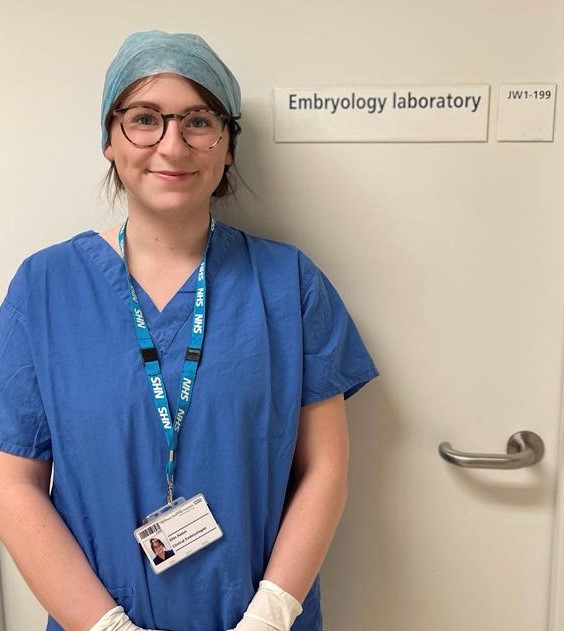World Embryologist Day: “One of the best parts of being an embryologist is interacting with our patients”
In this blog, Ellie shares how she became an embryologist and what she enjoys about her role.
It was during my time studying Biomedical Science at Warwick University that I really started to become interested in embryology. My sister had studied Biology a few years ahead of me and introduced me to it, and after attending some university lectures on Reproductive Science, I was able to build a bigger picture of the role. I was aware of IVF as a treatment but had never really thought about it in terms of an actual job until then. The fact it was a role that would combine hands-on lab skills with patient contact appealed to me.
After meeting with one of the lecturers to find out how to become an embryologist, they very kindly set up a research project for me based at the IVF unit in Coventry for my Master’s (MBio). As part of the project, I analysed the time-lapse data of embryo development from the unit, which was so interesting as it was something I had never seen before. I shadowed in the lab, as well as a few days in other labs, which helped me understand the day-to-day role of an embryologist and showed that I could deal with patient information and data while abiding by confidentiality and ethical requirements. I also attended the Fertility Conference that year, which was a great experience for someone wanting to become an embryologist and helped me to prep for the Scientist Training Programme (STP) interview. There’s no doubt in my mind that all this experience was invaluable for me when it came to preparing for my STP interview and successfully gaining a place the following year.
I was absolutely thrilled when I found out that I had got onto the STP, I honestly did not think that I would get a place, so I was absolutely over the moon when I saw that I had!
The first few months of my training were spent shadowing at Jessop Fertility – I sat in on medical and nursing consultations, pregnancy scans, theatre procedures and, of course, observed in the embryology lab. It was so useful to have this time to get to know how the teams worked together and learn the flow of fertility treatment cycles. This was something I hadn’t had much experience of before starting my training, as I’d only shadowed in a few labs. I also spent time in Genetics, Histology and Cytology as rotational placements, where I met trainees in other specialisms and learned about their areas of healthcare science
Balancing university and my training did take a little bit of getting used to, but I had a great support network at Jessops, which was invaluable during my training, and I was really lucky to be able to stay here after I finished my STP. Some of the favourite parts of my training were spending time with the other trainees during our time at Uni, gradually becoming more confident talking to patients, and becoming competent in some of the lab procedures. These felt so far away when I first started training!
For me, one of the best parts of being an embryologist is interacting with our patients, especially helping them understand the lab side of their treatment. The science behind embryology is fascinating and I love explaining the processes to others so that they can be fully involved in their treatment.
Working as part of a team is also something I find incredibly rewarding. I am so lucky to work with such an inspiring group of people who all helped to shape me as an embryologist. Working in a team, both the embryology team and the wider multidisciplinary team, keeps me learning and often offers a fresh perspective when you need some extra support. I like having the common goal of helping patients feel valued and supported through their treatment and enjoy working with others to try and achieve this.

Ellie works as an embryologist at Sheffield Teaching Hospitals NHS Foundation Trust. She studied Biomedical Science at Warwick University from 2014 to 2018, followed by a Master’s in Reproductive Science. After successfully applying to the Scientist Training Programme the following year, Ellie qualified as an embryologist in 2021.
Review date: 15 April 2027

